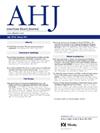HELicobacter Pylori screening to prevent gastrointestinal bleeding in patients with acute Myocardial Infarction (HELP-MI SWEDEHEART) - Design and rationale of a cluster randomized, crossover, registry-based clinical trial
IF 3.7
2区 医学
Q1 CARDIAC & CARDIOVASCULAR SYSTEMS
引用次数: 0
Abstract
Background
The role of Helicobacter pylori (H. pylori) screening and eradication on reducing upper gastrointestinal bleeding (UGIB) complications after acute myocardial infarction (MI) is uncertain. The HELicobacter pylori screening to prevent gastrointestinal bleeding in patients with acute MI (HELP-MI SWEDEHEART) trial aims to determine whether systematic H. pylori screening compared to usual care reduces UGIB, mortality, and cardiovascular outcomes after MI.
Methods
A cluster randomized, crossover, registry-based clinical trial using SWEDEHEART as trial platform for study population definition and source for data collection in combination with nationwide Swedish health data registries. Thirty-five Swedish hospitals, organized into 18 clusters based on percutaneous coronary intervention networks, were randomized to either routine H. pylori screening for adults with acute type-1 MI or usual care. After 1 year, a 2-month blanking period was followed by a crossover to the alternate allocation for 1 year. The trial enrolment was concluded after one additional year of registry-based follow-up. The primary endpoint is UGIB. Secondary endpoints include all-cause death, cardiovascular death, readmission for MI, stroke, or heart failure. Endpoints will be reported combined (Net Adverse Clinical Events; Major Adverse Cardiac or Cerebrovascular Events) and separately. The primary analysis will include all available follow-up time corresponding to a maximum follow-up time of 3 years and 2 months.
Conclusion
HELP-MI SWEDEHEART aims to determine the utility of routine H. pylori screening to reduce UGIB and improve cardiovascular outcomes after MI. By integrating national registry follow-up data with a pragmatic trial design, it has the potential to provide evidence for the effect of the implementation of routine H. pylori screening as part of acute MI care.
Trial Registration
ClinicalTrials.gov, NCT05024864.
幽门螺杆菌筛查预防急性心肌梗死患者胃肠道出血(HELP-MI SWEDEHEART)一项聚类随机、交叉、基于注册的临床试验的设计和基本原理
背景:幽门螺杆菌筛查和根除对减少急性心肌梗死(MI)后上消化道出血(UGIB)并发症的作用尚不确定。幽门螺杆菌筛查预防急性心肌梗死患者胃肠道出血(HELP-MI SWEDEHEART)试验旨在确定与常规护理相比,系统的幽门螺杆菌筛查是否能降低心肌梗死后的UGIB、死亡率和心血管结局。方法:采用SWEDEHEART作为研究人群定义的试验平台,并结合瑞典全国健康数据登记,进行一项聚类随机、交叉、基于注册的临床试验。35家瑞典医院,根据经皮冠状动脉介入网络分成18组,随机分为两组,一组为成人急性1型心肌梗死患者进行常规幽门螺杆菌筛查,另一组为常规护理。一年后,2个月的空白期,然后交叉到一年的备用分配。在额外一年的基于登记的随访后,试验入组结束。主要端点是UGIB。次要终点包括全因死亡、心血管死亡、心肌梗死再入院、中风或心力衰竭。终点将合并报告(净不良临床事件;主要心脏或脑血管不良事件)和单独。初步分析将包括所有可用的随访时间,最长随访时间为3年零2个月。结论:HELP-MI SWEDEHEART旨在确定常规幽门螺杆菌筛查在减少UGIB和改善心肌梗死后心血管结局方面的效用。通过将国家登记随访数据与实用的试验设计相结合,它有可能为常规幽门螺杆菌筛查作为急性心肌梗死护理的一部分的实施效果提供证据。试验注册:ClinicalTrials.gov, NCT05024864。
本文章由计算机程序翻译,如有差异,请以英文原文为准。
求助全文
约1分钟内获得全文
求助全文
来源期刊

American heart journal
医学-心血管系统
CiteScore
8.20
自引率
2.10%
发文量
214
审稿时长
38 days
期刊介绍:
The American Heart Journal will consider for publication suitable articles on topics pertaining to the broad discipline of cardiovascular disease. Our goal is to provide the reader primary investigation, scholarly review, and opinion concerning the practice of cardiovascular medicine. We especially encourage submission of 3 types of reports that are not frequently seen in cardiovascular journals: negative clinical studies, reports on study designs, and studies involving the organization of medical care. The Journal does not accept individual case reports or original articles involving bench laboratory or animal research.
 求助内容:
求助内容: 应助结果提醒方式:
应助结果提醒方式:


